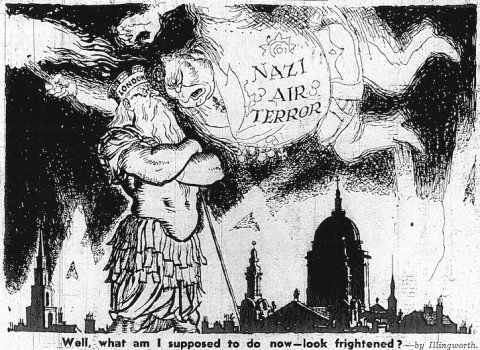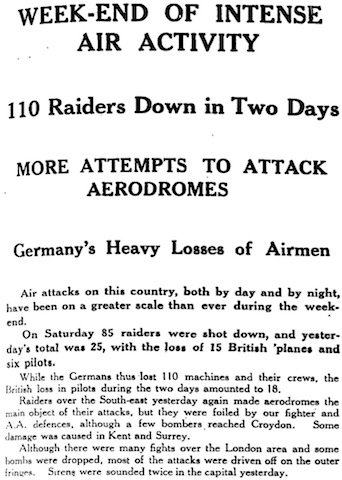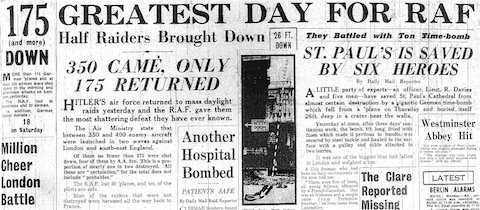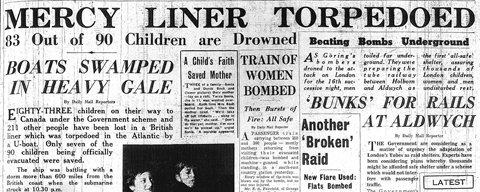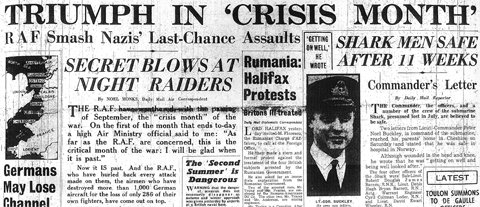
Saturday's bombing of London isn't quite as prominent on the front page of the Daily Mail as one might expect. There are a few small items about it (e.g. a panorama of London ablaze, taken from the top of Northcliffe House; a report from Italian radio that Londoners are 'absolutely terrified' by the raids) but there's actually more about the threatened German invasion (including a report of false alarms in Surrey, the south-west and Scotland). And the main article, by air correspondent Noel Monks, deals with both. It reports that yesterday was a fairly quiet day, and that London's casualties are around 400 dead and 1300 or 1400 wounded (presumably not including those from last night's raid). Monks gives much cause for optimism: the Air Staff believe that Germany has recalled aircraft from Norway to take part 'in the Battle of Britain', and that German bomber crews are making up to three sorties a day.
This seems to indicate that the German air force is not so great as Hitler would have the world believe, though it is still ahead of the R.A.F. in numerical terms.
When taken together with the RAF's belief that 'it is a case of "now or never"' and that
If Hitler has not gained aerial superiority by October 1, his invasion plans will be definitely postponed and possibly abandoned
There's more on the inside pages, including this cartoon by Illingworth on page 2. Emrys Jones reports that 'I saw what the raiders did' (well, so did a lot of people, I guess) and quotes one 'irrepressible' AFS man, still on duty after 19 hours of fighting fires in East London, as saying:
"Hitler shall pay for this."
That phrase I heard more than once.
But the editorial on the same page says the Daily Mail does not approve of talk of reprisals.
We prefer to put it another way: that the British Forces, the R.A.F. especially, will pursue a steadily increasing campaign against Germany for set purposes to victory, and that object will in time become overwhelming.
(It also recommends that the RAF put aside a 'special force of fighter 'planes to deal with the German dive-bombing Stukas', which might spearhead invasion here as they did in Belgium and France.)
On page 3, there are photos of bombed-out London flats which 'might have been taken during the Spanish war; in Poland; or France'. Underneath is a report on the firefighting and rescue work which has been going on since Saturday night. People made homeless by the bombing are being ferried across the Thames to temporary accommodation:
Some carried their remaining possessions in pillow cases. Some had brown-paper parcels.
Others wheeled precious odds and ends on to the ferry boats in prams.
As they waited on the pier fires crackled around them -- fires that had blazed all night on the dockside, wharf fires, factory fires, blackening the sky with acrid smoke.
This is about as close as the Mail gets to reporting on the 'aimless evacuation' of people who haven't been bombed out, from the East End to 'what are believed to be safer places, e.g. the St James's Park shelters and Paddington Station', which today's Home Intelligence briefing discusses. This is ascribed to (a perfectly natural, one might feel)
deeply felt apprehension [...] of a continuation of raids, and much anxiety about the chaos in domestic affairs which has resulted from the activities of the last few nights.
Male factory workers are 'encouraging their wives and families in this haphazard escape', though they themselves are willing to stay on. Less happily, there are signs of 'anti-Semitic trouble' in the East End.
Owing to the behaviour of the Jews [who] are said to show too great a keenness to save their own skins and too little consideration for other people [...] It is believed locally that this situation may at any moment become extremely serious.
Although there are strong feelings of 'shock' in London, due to people having lulled themselves into a false sense of security, there are
No signs of defeatism except among small section of elderly women in 'front line' such as East Ham who cannot stand constant bombing.
However, 'in Dockside areas the population is showing visible signs of nerve cracking from constant ordeals'. There are also 'many expressions of bitterness' from people who are bewildered at the 'apparent impossibility of stopping German raiders' -- the small volume of anti-aircraft fire is particularly mentioned. Such signs of nervousness and anxiety should be borne in mind when considering the Daily Mail's editorial maxim on page 2: 'We endure to conquer'.
![]() This work is licensed under a Creative Commons Attribution-NonCommercial-NoDerivatives 4.0 International License.
Permissions beyond the scope of this license may be available at http://airminded.org/copyright/.
This work is licensed under a Creative Commons Attribution-NonCommercial-NoDerivatives 4.0 International License.
Permissions beyond the scope of this license may be available at http://airminded.org/copyright/.

